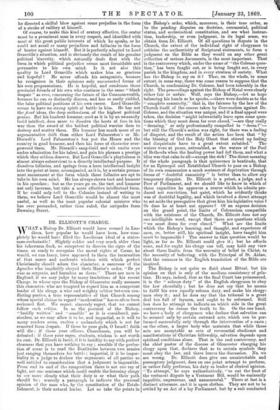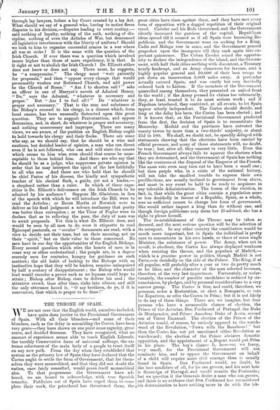DR. ELLICOTT'S CHARGE. DR. ELLICOTT'S CHARGE.
THAT a Bishop Dr. Ellicott would have seemed in Laodicea, how popular he would have been, how completely he would have filled the Laodicean ideal of a statesman-ecclesiastic ! Slightly colder and very much abler than his lukewarm flock, so competent to discern the signs of the times, so ready to recognize the moral rights of Ca3sar, he would, we can fancy, have appeared to them the incarnation of that suave and moderate wisdom with which perfect Christianity should adorn the character, a successor of the Apostles who implicitly obeyed their Master's order, "Be ye wise as serpents, and harmless as doves." There are men in England, if we may judge by many laudations of his recent Charge, in whose eyes the Bishop of Gloucester really assumes this character, who are tempted to regard him as a competent leader of his clergy, a wise and weighty arbiter between conflicting parties, a true representative of that Church among whose special claims to regard "moderation" has so often been reckoned first. We regret, sincerely regret, that we cannot follow such critics. In us the pastoral of the Bishop, "lucidly written" and " sensible" as it is considered, passionless, as we may allow it to be, and impartial, as it will to many readers seem, excites a melancholy which is not far removed from despair. If these be your gods, 0 Israel ! faith will die ; if these your officers, Churchmen, you will be defeated ; if these your sages, students, wisdom is not worth its cost. Dr. Ellicott is lucid, if it is lucidity to say with perfect clearness that you have nothing to say ; sensible if the perfection of sense is to read the Beatitudes between two armies just ranging themselves for battle ; impartial, if it be impartiality in a judge to declare the arguments of all parties so well entitled to consideration that a judgment is impossible. From end to end of the composition there is not one ray of light, not one sentence which could enable the listening clergy to see more clearly what their duty is or what their path should be ; scarcely a paragraph to indicate the personal opinion of the man who, by the constitution of the Establishment, is their natural leader. Let us take the points in
the Bishop's order, which, moreover, is their true order, as to the pending disputes on doctrine, ceremonial, political status, and ecclesiastical constitution, and see what instruction, leadership, or even judgment, in its legal sense, we obtain from Dr. Ellicott. Of all questions in dispute in the Church, the extent of the individual right of clergymen to criticize the authenticity of Scriptural statements, to form a judgment on the Bible as they would on any other great collection of serious documents, is the most important. That is the controversy which, under the name of " the Colenso question," has been fought out, or is being fought out, in every parish in the kingdom, and in every stratum of society. What has the Bishop to say on it ? That, on the whole, to some extent, in some way, there was some reason to suppose that the Church, in condemning Dr. Colenso, had been tolerably in the right. The proceedings against the Bishop of Natal were clearly either fair or unfair. Well, says the Bishop,—let us hope balancing his hands as he speaks,—there were doubts as to the " complete canonicity," that is, the fairness by the law of the Church itself, of the course taken by Convocation against Dr. Colenso, and the situation was unique, and if a final appeal were taken, the decision "might inferentially leave open some questions which they must deem for ever closed,"—are they really " deeming," or only professionally compelled to "deem?"— but still the Church's action was right, for there was a feeling of disquiet, and the result of the action has been that " by the blessing of God the Holy Ghost that stirred up feeling and disquietude have to a great extent subsided." The waters were at peace, untroubled, as the waters of the Pool of Bethesda when the healing power had left them, and what a bliss was that calm to all—except the sick! The direct meaning of the whole paragraph is that quiescence is beatitude, that for an Episcopal and Established Church to pass on a Bishop of its own communion a mock sentence of deprivation through forms of " doubtful canonicity " is better than to allow any temporary disquiet. Dr. Ellicott is a priest, a judge, and a Peer of Parliament, and we should like to know in which of those capacities he approves a course which he admits produced not conviction, but quiet, which he evidently thinks was of doubtful legality, and which involved a direct attempt to set aside the prerogative that gives him his legislative voice ? Or does he at heart not approve ? Of an express decision on the grand point, the limits of Colensoism compatible with the existence of the Church, Dr. Ellicott does not say one intelligible word, except that there are questions which " we must deem for ever closed." What are the limits which the Bishop's learning, and thought, and experience of men, or, better still, his spiritual insight, have taught him must be impassable ? The answer to that question would be light, as far as Dr. Ellicott could give it ; but he affords none, and for aught his clergy can tell, may hold any view about these limits, from the necessity of belief in Christ, to the necessity of believing, with the Principal of St. Aidan, that the commas in the English translation of the Bible are inspired.
The Bishop is not quite so fluid about Ritual, but his opinion on that is only of the medium consistency of gelatine. He says, indeed, that as the final Court has pronounced, it is the " solemn duty " of the English clergymen to obey the law cheerfully ; but he does not say that he means to fulfil his own equally solemn duty, and make his clergymen obey it ; and he does say that the tribunal is a great deal too full of laymen, and ought to be reformed. Still less does he attempt to indicate on which side in the great controversy he deems the truth to lie. On the one hand, we have a body of clergymen who declare that salvation can be secured only by certain outward acts, which can be performed successfully only through the intervention of a caste ; on the other, a larger body who maintain that while those acts are acceptable as acts of reverential obedience and manifestations of Christian fellowship, salvation depends upon spiritual conditions alone. That is the real controversy, and the chief pastor of the diocese of Gloucester charging his clergy upon that, declares that as to certain symbols they must obey the law, and there leaves the discussion. No, we are wrong. Dr. Ellicott does give one unmistakable and peremptory judgment, does on one point attempt to perform, or rather fully performs, his duty as leader of clerical opinion. "To attempt," he says authoritatively, "to cut the knot of the vestment dispute by a Vestment Bill, would be eminently impolitic, ungenerous, and unsuccessful." There at last is a distinct utterance, and it is upon clothes. They are not to be settled by an Act of a lay Parliament, but by a suit conducted through lay lawyers, before a lay Court created by a lay Act. What should we say of a general who, having to notice fierce disputes in his division,—disputes leading to overt mutiny,— said nothing of loyalty, nothing of the oath, nothing of discipline, nothing of even the Articles of War, but denounced all legislative interference with the liberty of uniform? Should we look to him to organize successful armies in a war where all was at stake ? It is the same with the question of the Irish Church. If ever there was a question which involved issues higher than those of mere expediency, it is that. Is it right or not to abolish the Irish Church I' Dr. Ellicott either does not know or does not say. There must, he suggests, be " a compromise." The clergy must " wait patiently for proposals," and then " oppose every change that would presumably weaken our Reformed Church, and add power to the Church of Rome." " Am I to shorten sail ? " asks an officer in one of Marryat's novels of Admiral Honey. " Do," says the Admiral, " whatever is necessary and proper." But " Am I to furl all? " Do " whatever is proper and necessary." That is the sum and substance of the Bishop's counsel to his clergy, in a diocese which, from local causes, has been unusually distracted upon this great question. They are to support Protestantism, and oppose Romanism, and, in short, do whatever is proper and necessary, and nothing unnecessary and improper. There are many views, we are aware, of the position an English Bishop ought to hold towards his clergy and their flocks. There are some who say, as we should say, that he should be a wise and cautious, but decided leader of opinion, a man who can direct even if he is not followed, who can and will state the course which seems to him wise, even should that course be unacceptable to those behind him. And there are who say that he should be as a judge, who suppresses private opinion in order that he may interpret the spirit of the law faithfully to all who sue. And there are who hold that he should be chief Pastor of his diocese, the kindly and sympathetic teacher of his clerical flock, a guide, yet not a leader,— a shepherd rather than a ruler. In which of these capacities is Dr. Ellicott's deliverance on the Irish Church to be admired by his audience ? Suppose Mr. Gladstone, in lieu of the speech with which he will introduce the Bill, were to read the Articles ; or Baron Martin at Norwich were to deliver as his final judgment a solemn testimony that purity was better than corruption ; or the Vicar of Poplar were to declare that as to relieving the poor, the duty of man was to await proposals. Yet this is what Dr. Ellicott does, and would be seen by all men to do, were it etiquette to read Episcopal pastorals, as "secular" documents are read, with a view to decide not their tone, but on their meaning, not on their "spirit," but on their value to those concerned. No men have in our day the opportunities of the English Bishops. Every second question which stirs the hearts of men is in some way or other ecclesiastical ; the people are, in a degree scarcely seen for centuries, hungry for guidance on such matters ; the old habit of looking to the Bishops with an instinctive hope that they will be leaders, remains unimpaired by half a century of disappointment ; the Bishop who would lead would exercise a power such as no layman could hope to attain ; Bishop after Bishop rises to deliver his soul ; the attentive crowd, time after time, sinks into silence, and still the only utterance heard is, " 0 my brethren, do ye, if it is convenient, that which is proper to be done !"



































 Previous page
Previous page